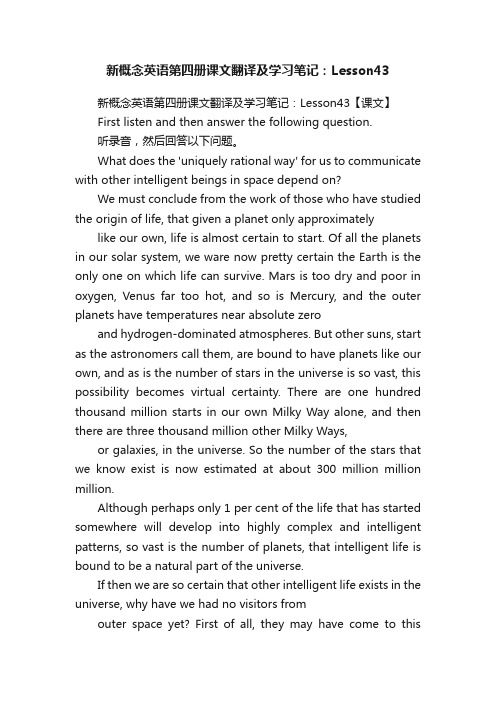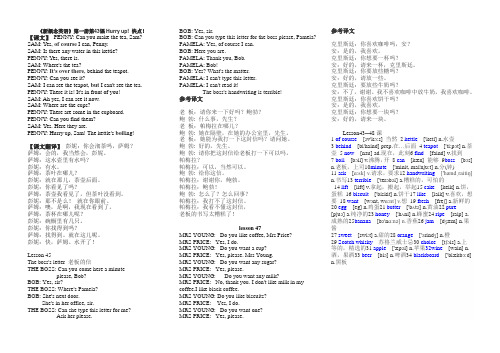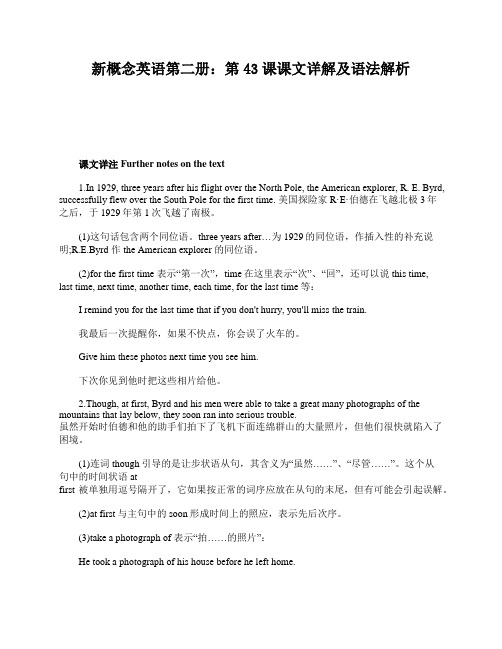新概念第43课课文
新概念英语第四册课文翻译及学习笔记:Lesson43

新概念英语第四册课文翻译及学习笔记:Lesson43新概念英语第四册课文翻译及学习笔记:Lesson43【课文】First listen and then answer the following question.听录音,然后回答以下问题。
What does the 'uniquely rational way' for us to communicate with other intelligent beings in space depend on?We must conclude from the work of those who have studied the origin of life, that given a planet only approximately like our own, life is almost certain to start. Of all the planets in our solar system, we ware now pretty certain the Earth is the only one on which life can survive. Mars is too dry and poor in oxygen, Venus far too hot, and so is Mercury, and the outer planets have temperatures near absolute zeroand hydrogen-dominated atmospheres. But other suns, start as the astronomers call them, are bound to have planets like our own, and as is the number of stars in the universe is so vast, this possibility becomes virtual certainty. There are one hundred thousand million starts in our own Milky Way alone, and then there are three thousand million other Milky Ways,or galaxies, in the universe. So the number of the stars that we know exist is now estimated at about 300 million million million.Although perhaps only 1 per cent of the life that has started somewhere will develop into highly complex and intelligent patterns, so vast is the number of planets, that intelligent life is bound to be a natural part of the universe.If then we are so certain that other intelligent life exists in the universe, why have we had no visitors fromouter space yet? First of all, they may have come to thisplanet of ours thousands or millions of years ago, and found our then prevailing primitive state completely uninteresting to their own advanced knowledge. Professor Ronald Bracewell,a leading American radio astronomer, argued in Nature that such a superior civilization, on a visit to our own solar system, may have left an automatic messenger behind to await the possible awakening of an advanced civilization. Such a messenger, receiving our radio and television signals, might well re-transmit them back to its home-planet, although what impression any other civilization would thus get from us is best left unsaid.But here we come up against the most difficult of all obstacles to contact with people on other planets -- the astronomical distances which separate us. As a reasonable guess, they might, on an average, be 100 light years away. (A light year is the distance which light travels at 186,000miles per second in one year, namely 6 million million miles.) Radio waves also travel at the speed of light, and assuming such an automatic messenger picked up our first broadcasts of the 1920's, the message to its home planet is barely halfway there. Similarly, our own present primitive chemical rockets, though good enough to orbit men, have no chance oftransporting us to the nearest other star, four light years away, let alone distances of tens or hundreds of light years.Fortunately, there is a 'uniquely rational way' for us to communicate with other intelligent beings, as Walter Sullivan has put it in his excellent book, We Are not Alone. Thisdepends on the precise radio frequency of the 21-cm wavelength, or 1420 megacycles per second. It is the naturalfrequency of emission of the hydrogen atoms in space and was discovered by us in 1951; it must be known to any kind of radio astronomer in the universe.Once the existence of this wave-length had been discovered, it was not long before its use as the uniquely recognizable broadcasting frequency for interstellar communication was suggested. Without something of this kind, searching for intelligences on other planets would be like trying to meet a friend in London without a pre-arranged rendezvous and absurdly wandering the streets in the hope of a chance encounter.ANTHONY MICHAELIS Are There Strangers in Space? from The Weekend Telegraph【New words and expressions 生词和短语】Mercury n. 水星hydrogen n. 氢气prevailing adj. 普遍的radio astronomer 射电天方学家uniquely adv. 地rational adj. 合理的radio frequency 无线电频率cm n. 厘米megacycle n. 兆周。
新概念英语第二册第43课:OvertheSouthPole

新概念英语第二册第43课:OvertheSouthPole新概念英语第二册第43课:Over the South PoleLesson 43 Over the South Pole飞越南极First listen and then answer the question.听录音,然后回答以下问题。
How was the plane able to clear the mountains?In 1929, three years after his flight over the North Pole, the American explorer, R.E. Byrd, successfully flew over the South Pole for the first time. Though, at first, Byrd and his men were able to take a great many photographs of the mountains that lay below, they soon ran into serious trouble. At one point, it seemed certain that their plane would crash. It could only get over the mountains if it rose to 10,000 feet. Byrd at once ordered his men to throw out two heavy food sacks. The plane was then able to rise and it cleared the mountains by 400 feet. Byrd now knew that he would be able to reach the South Pole which was 300 miles away, for there were no more mountains in sight. The aircraft was able to fly over the endless white plains without difficulty.参考译文美国探险家R.E. 伯德在飞越北极3年之后,于1929年第一次飞越了南极。
新概念一lesson43-48课文及知识点

《新概念英语》第一册第43课Hurry up! 快点!【课文】PENNY: Can you make the tea, Sam? SAM: Yes, of course I can, Penny.SAM: Is there any water in this kettle? PENNY: Yes, there is.SAM: Where's the tea?PENNY: It's over there, behind the teapot. PENNY: Can you see it?SAM: I can see the teapot, but I can't see the tea. PENNY: There it is! It's in front of you!SAM: Ah yes, I can see it now.SAM: Where are the cups?PENNY: There are some in the cupboard. PENNY: Can you find them?SAM: Yes. Here they are.PENNY: Hurry up, Sam! The kettle's boil ing! 【课文翻译】彭妮:你会沏茶吗,萨姆?萨姆:会的,我当然会,彭妮。
萨姆:这水壶里有水吗?彭妮:有水。
萨姆:茶叶在哪儿?彭妮:就在那儿,茶壶后面。
彭妮:你看见了吗?萨姆:茶壶我看见了,但茶叶没看到。
彭妮:那不是么!就在你眼前。
萨姆:噢,是啊,我现在看到了。
萨姆:茶杯在哪儿呢?彭妮:碗橱里有几只。
彭妮:你找得到吗?萨姆:找得到。
就在这儿呢。
彭妮:快,萨姆。
水开了!Lesson 45The boss's letter 老板的信THE BOSS: Can you come here a minuteplease, Bob?BOB: Yes, sir?THE BOSS: Where's Pamela?BOB: She's next door.She's in her office, sir.THE BOSS: Can she type this letter for me?Ask her please. BOB: Yes, sir.BOB: Can you type this letter for the boss please, Pamela?PAMELA: Yes, of course I can.BOB: Here you are.PAMELA: Thank you, Bob.PAMELA: Bob!BOB: Yes? What's the matter.PAMELA: I can't type this letter.PAMELA: I can't read it!The boss's handwriting is terrible!参考译文老板:请你来一下好吗?鲍勃?鲍勃: 什么事,先生?老板:帕梅拉在哪儿?鲍勃: 她在隔壁,在她的办公室里,先生。
新概念43课课文原文

新概念43课课文原文全文共四篇示例,供读者参考第一篇示例:《新概念英语》是一套备受广大英语学习者喜爱的教材,在其中课文内容优秀,语言简洁,适合各个阶段的学习者学习。
其中的第43课也是一个很有趣的课文,接下来我们将为大家呈现《新概念43课》的原文和一些解析。
原文如下:CarsAlmost everyone has a dream car. For some people, it may be a big, shiny Mercedes or a sporty Porsche, but most people just dream of owning a small, practical car.这篇文章主要讲述了汽车在现代社会中的地位和影响。
文章首先提到了几乎每个人都有自己梦想的汽车,有些人梦想拥有一辆大气的梅赛德斯或者一辆运动型的保时捷,但大多数人只是梦想着拥有一辆小巧实用的汽车。
现在,汽车对大多数人来说已经成为了一种生活方式,不再像过去那样是一种奢侈品。
事实上,对许多人来说,拥有一辆汽车已经不再是一种奢侈,而是一种必需。
汽车的确方便快捷,但它们也带来了问题。
它们污染空气,噪音污染。
它们占用空间且危险。
在世界的许多地方,汽车如此之多以至于交通堵塞已经成为了日常生活的一部分。
没有人喜欢被困在交通中,但我们都花了很多时间在拥挤的道路上开车。
难以想象一个没有汽车的世界,但我们对它们的依赖造成了许多问题。
有些人认为增加汽车可以解决世界交通问题,但也有人认为汽车引发了更多的问题。
也许我们需要在汽车拥有的益处和弊端之间找到一个平衡。
没有人可以否认汽车的便利性,但我们也必须考虑它们对环境和我们生活质量的影响。
最终,决定汽车是祸害还是祝福,还在于我们每个人的选择。
这篇文章不仅展示了汽车在我们生活中的重要性,也提醒我们要意识到汽车对环境造成的影响。
我们应该反思我们对汽车的依赖,并探索更环保、可持续的出行方式。
希望这篇分析能够帮助大家更好地理解和思考《新概念43课》的内容。
新概念英语第二册:第43课课文详解及语法解析

新概念英语第二册:第43课课文详解及语法解析课文详注 Further notes on the text1.In 1929, three years after his flight over the North Pole, the American explorer, R. E. Byrd, successfully flew over the South Pole for the first time. 美国探险家 R·E·伯德在飞越北极3年之后,于1929年第1次飞越了南极。
(1)这句话包含两个同位语。
three years after…为 1929的同位语,作插入性的补充说明;R.E.Byrd 作 the American explorer 的同位语。
(2)for the first time 表示“第一次”,time在这里表示“次”、“回”,还可以说 this time,last time, next time, another time, each time, for the last time等:I remind you for the last time that if you don't hurry, you'll miss the train.我最后一次提醒你,如果不快点,你会误了火车的。
Give him these photos next time you see him.下次你见到他时把这些相片给他。
2.Though, at first, Byrd and his men were able to take a great many photographs of the mountains that lay below, they soon ran into serious trouble.虽然开始时伯德和他的助手们拍下了飞机下面连绵群山的大量照片,但他们很快就陷入了困境。
新概念英语第一册第43-44课-Hurry up!

新概念英语第一册第43-44课:Hurry up!Lesson 43 Hurry up!快点!Listen to the tape then answer this question.How do you know Sam doesnt make the tea very often?听录音,然后回答问题。
你怎么知道萨姆不常沏茶?Can you make the tea, Sam?彭妮:你会沏茶吗,萨姆?Yes, of course I can, Penny.萨姆:会的,我当然会,彭妮。
Is there any water in this kettle?萨姆:这水壶里有水吗?Yes, there is.彭妮:有水。
Wheres the tea?萨姆:茶叶在哪儿?Its over there, behind the teapot.彭妮:就在那儿,茶壶后面。
Can you see it?彭妮:你观察了吗?I can see the teapot, but I cant see the tea.萨姆:茶壶我观察了,但茶叶没看到。
There it is!Its in front of you.彭妮:那不是么!就在你眼前。
Ah yes, I can see it now.萨姆:噢,是啊,我现在看到了。
Where are the cups?萨姆:茶杯在哪儿呢?There are some in the cupboard.彭妮:碗橱里有几只。
Can you find them?彭妮:你找得到吗?Yes. Here they are.萨姆:找得到。
就在这儿呢。
Hurry up, Sam.The kettles boiling.彭妮:快,萨姆。
水开了!New Word and expressions生词和短语of course当然kettlen. 水壶behindprep.在后面teapotn. 茶壶nowadv. 现在,此刻findv. 找到boilv. 沸腾,开Notes on the text课文解释1 make the tea 沏茶。
新概念第三册课文翻译及学习笔记【Lesson43、44、45】

新概念第三册课文翻译及学习笔记【Lesson43、44、45】 【课文】 Insurance companies are normally willing to insure anything. Insuring public or private property is a standard practice in most countries in the world. If, however, you were holding an open air garden party or a fete it would be equally possible to insure yourself in the event of bad weather. Needless to say, the bigger the risk an insurance company takes, the higher the premium you will have to pay.It is not uncommon to hear that a ship ping company has made a claim for the cost of salvaging a sunken ship. But the claim made by a local authority to recover the cost of salvaging a sunken pie dish must surely be unique. Admittedly it was an unusual pie dish, for it was eighteen feet long and six feet wide. It had been purchased by a local authority so that an enormous pie could be baked for an annual fair. The pie committee decided that the best way to transport the dish would be by canal, so they insured it for the trip. Shortly after it was launched, the pie committee went to a local inn to celebrate. At the same time, a number of teenagers climbed on to the dish and held alittle party of their own. Dancing proved to be more than the dish could bear, for during the party it capsized and sank in seven feet of water. The pie committee telephoned a local garage owner who arrived in a recovery truck to salvage the pie dish.Shivering in their wet clothes, the teenagers looked on while three men dived repeatedly into the water to locate the dish. They had little difficulty in finding it, but hauling it out of the water proved to be a serious problem. The sides of the dish were so smooth that it was almost impossible to attach hawsers and chains to the rim without damaging it. Eventually chains were fixed to one end of the dish and a powerful winch was put into operation. The dish rose to the surface and was gently drawn towards the canal bank. For one agonizing moment, the dish was perched precariously on the bank of the canal, but it suddenly overbalanced and slid back into the water. The men were now obliged to try once more. This time they fixed heavy metal clamps to both sides of the dish so that they could fasten the chains. The dish now had to be lifted vertically because one edge was resting against the side of the canal. The winch was again put into operation and one of the men started up the truck. Several minutes later, the dish was successfully hauled above the surface of the water. Water streamed in torrents over its sides with such force that it set up a huge wave in the canal. There was danger that the wave would rebound off the other side of the bank and send the dish plunging into the water again. By working at tremendous speed, the men managed to get the dish on to dry land before the wave returned. 【课文翻译】 保险公司一般说来愿意承保一切东西。
新概念英语第一册第43-44课-Hurry up!

新概念英语第一册第43-44课:Hurry up!Lesson 43 Hurry up!快点!Listen to the tape then answer this question.How do you know Sam doesnt make the tea very often?听录音,然后回答问题。
你怎么知道萨姆不常沏茶?Can you make the tea, Sam?彭妮:你会沏茶吗,萨姆?Yes, of course I can, Penny.萨姆:会的,我当然会,彭妮。
Is there any water in this kettle?萨姆:这水壶里有水吗?Yes, there is.彭妮:有水。
Wheres the tea?萨姆:茶叶在哪儿?Its over there, behind the teapot.彭妮:就在那儿,茶壶后面。
Can you see it?彭妮:你观察了吗?I can see the teapot, but I cant see the tea.萨姆:茶壶我观察了,但茶叶没看到。
There it is!Its in front of you.彭妮:那不是么!就在你眼前。
Ah yes, I can see it now.萨姆:噢,是啊,我现在看到了。
Where are the cups?萨姆:茶杯在哪儿呢?There are some in the cupboard.彭妮:碗橱里有几只。
Can you find them?彭妮:你找得到吗?Yes. Here they are.萨姆:找得到。
就在这儿呢。
Hurry up, Sam.The kettles boiling.彭妮:快,萨姆。
水开了!New Word and expressions生词和短语of course当然kettlen. 水壶behindprep.在后面teapotn. 茶壶nowadv. 现在,此刻findv. 找到boilv. 沸腾,开Notes on the text课文解释1 make the tea 沏茶。
- 1、下载文档前请自行甄别文档内容的完整性,平台不提供额外的编辑、内容补充、找答案等附加服务。
- 2、"仅部分预览"的文档,不可在线预览部分如存在完整性等问题,可反馈申请退款(可完整预览的文档不适用该条件!)。
- 3、如文档侵犯您的权益,请联系客服反馈,我们会尽快为您处理(人工客服工作时间:9:00-18:30)。
新概念第43课课文
摘要:
1.新概念第43 课课文概述
2.文章的主要内容和结构
3.文章的核心观点和结论
正文:
新概念第43 课课文概述
新概念第43 课课文是一篇关于人类行为和心理的科学文章。
文章主要讨论了人们是如何感知和处理信息的,以及如何通过学习和训练来改变和优化这种感知和处理方式。
文章的主要内容和结构
文章首先介绍了人类感知和处理信息的方式,包括视觉、听觉、触觉等。
然后,文章通过实例说明了人们在不同情况下是如何感知和处理信息的,比如在阅读、驾驶、做决策等方面。
接着,文章讨论了学习和训练对感知和处理信息的影响,包括如何通过训练来提高某种感知能力,如何通过学习来改变对某种信息的处理方式等。
最后,文章总结了人类感知和处理信息的特点和局限,以及如何通过科学的方法和态度来优化和提高这种能力。
文章的核心观点和结论
文章的核心观点是,人类的感知和处理信息能力是可以通过学习和训练来改变和优化的。
